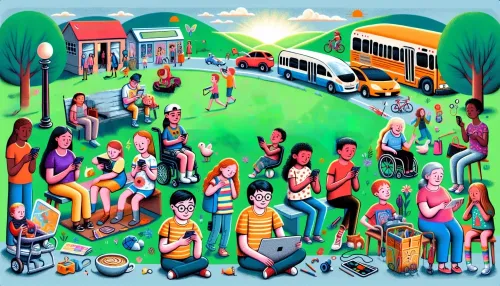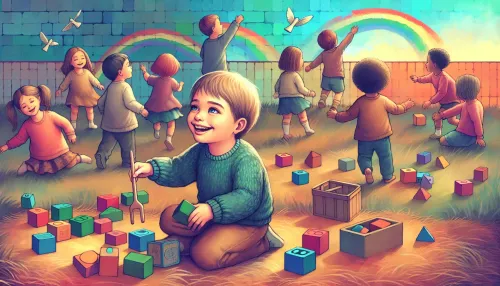Navigating Social Media: Cultivating Connections for Autistic Children Online

Social media has become an integral part of modern life, offering opportunities for connectivity, personal expression, and community building. For autistic children, social media can be a powerful tool to enhance communication skills, foster a sense of belonging, and express themselves creatively. In this article, we'll explore the potential of leveraging social platforms for autistic children and provide valuable insights for parents and creators on fostering a safe and inclusive online environment.
Social media platforms offer diverse ways for autistic children to communicate and express themselves. From text-based posts to visual content and messaging features, these platforms provide avenues for individuals to engage with others on their own terms. For many autistic children, social media serves as a medium to practice social interactions in a less intimidating environment, allowing them to refine their communication skills and build confidence.
Leveraging Social Media for Communication Skills
One effective way to leverage social platforms for enhancing communication skills is by encouraging autistic children to share their interests, hobbies, and thoughts with like-minded individuals online. By doing so, they can develop the ability to initiate conversations, respond to comments, and express themselves authentically, fostering valuable social skills that can positively impact their offline interactions as well.
While social media presents numerous opportunities for connection and self-expression, it's essential for parents to prioritize safety when their autistic children engage online. Establishing clear guidelines and boundaries around online interactions can help ensure a secure and positive experience for autistic individuals. Here are some practical tips for parents:
Safety Tips for Parents Managing Online Interactions
Supervise and Monitor: Regularly monitor your child's online activity, ensuring that they are engaging with appropriate content and avoiding potentially harmful interactions.
Privacy Settings: Familiarize yourself with privacy settings on various social platforms and adjust them to limit the visibility of personal information.
Open Communication: Encourage open dialogue with your child about their online experiences. Create a safe space for them to share any concerns or experiences that make them uncomfortable.
Educate About Online Risks: Teach your child about online safety practices, such as recognizing and avoiding potential threats or scams.
By prioritizing safety and proactively managing online interactions, parents can empower autistic children to navigate social media responsibly while minimizing potential risks.
Visual storytelling through images, videos, and creative content can be a powerful mode of self-expression for autistic individuals. Many social media platforms provide robust features for sharing visual narratives, allowing autistic children to showcase their unique perspectives and talents. Whether through photography, artwork, or multimedia posts, visual storytelling enables autistic individuals to communicate emotions, experiences, and ideas in a non-verbal manner.
Additionally, the use of visual storytelling can facilitate connections with peers who share similar creative interests. As part of building an online community, autistic children can find support and encouragement from individuals who appreciate and understand their visual expressions.
Related Article: Breaking Barriers: Out-of-the-Box Approaches to Addressing Social Challenges Faced by Autistic Children
Visual Storytelling: A Powerful Tool for Self-Expression
The impact of social media goes beyond mere virtual interactions; it can lead to meaningful connections that transcend the digital realm. There are numerous heartwarming stories of autistic children forming genuine friendships through social networks. These connections have the potential to reduce feelings of isolation, nurture empathy, and offer invaluable support during both challenging and joyful moments.
By sharing these real-life stories of connections made through social networks, we highlight the profound impact that online relationships can have on the lives of autistic children. These narratives serve as powerful testimonials demonstrating the potential for social media to cultivate lasting friendships and create a sense of belonging for autistic individuals.
Real-Life Stories: Connections Made Through Social Networks
While social media can be a beneficial tool for enhancing communication skills and building connections for autistic children, it's crucial to assess the impact of screen time and interaction quality on overall social skills development. Balancing screen time with other activities that promote face-to-face communication is essential in ensuring a holistic approach to skill development.
Moreover, evaluating the quality of interactions on social media is equally important. Encouraging meaningful conversations, fostering empathy in response to others' content, and practicing digital etiquette contribute to positive online experiences that align with broader social skills development goals.
Impact of Screen Time on Social Skills Development
Digital literacy encompasses the knowledge and competencies required to navigate digital environments effectively. For autistic children engaging with social media, developing digital literacy skills is essential for understanding privacy settings, discerning reliable information from misinformation, and practicing responsible digital citizenship.
Parents play a critical role in supporting their children's digital literacy journey by providing guidance on identifying trustworthy sources of information, understanding the implications of sharing personal content online, and navigating potential challenges related to cyberbullying or inappropriate conduct from others.
Moderated online communities tailored specifically for autistic individuals offer a supportive environment where they can engage with like-minded peers under the guidance of moderators who ensure respectful interactions and adherence to community guidelines. These communities often serve as valuable spaces for sharing experiences, seeking advice, and fostering friendships based on common interests.
Digital Literacy for Confident Online Navigation
By emphasizing the importance of moderated online communities in providing a supportive environment for autistic children on social media platforms, we underscore the significance of creating spaces where they feel accepted, understood, and empowered to express themselves authentically while receiving positive support from their community members.
Social media creators have an influential role in shaping the inclusivity of online spaces. When developing content intended for consumption by diverse audiences that include autistic individuals:
The Role of Moderated Online Communities in Support
Captioning Visual Content: Providing descriptive captions for images or videos ensures accessibility for individuals with various communication preferences or sensory sensitivities.
Promoting Positive Messaging: Advocating kindness and acceptance fosters an inclusive environment where all individuals feel welcome and valued.
Engaging Authentically: Encouraging meaningful engagement through open-ended questions or prompts invites diverse perspectives from autistic audiences while promoting active participation within the community.
Creating Inclusive Content: Guidelines for Creators
By integrating these guidelines into their content creation strategies, social media creators contribute to an inclusive digital landscape where all individuals can participate meaningfully without encountering barriers due to their neurodiversity.
In conclusion, the potential of social media as a tool for autistic children extends far beyond casual interactions; it offers avenues for self-expression, skill development, community building, and meaningful connections that enrich their lives. By understanding the nuances of leveraging social platforms in a safe and inclusive manner, parents can empower their children to navigate online spaces confidently while fostering valuable digital literacy skills. Moreover, creators have an important role in cultivating an inclusive environment where autistic individuals feel respected and embraced within online communities.
Navigating Social Media: Cultivating Connections for Autistic Children Online embraces the digital age as an opportunity to amplify voices within the autism community while promoting empathy, understanding, and acceptance across diverse online platforms.
Frequently Asked Questions
Social media provides various platforms for autistic children to communicate and express themselves. By sharing interests and engaging with others, they can practice social interactions in a supportive environment, helping them build confidence and refine their communication skills, which positively impacts their offline relationships.
Parents should supervise their child's online activity, familiarize themselves with privacy settings, encourage open communication about online experiences, and educate their child about online risks. These steps help ensure a safe and positive experience while empowering children to navigate social media responsibly.
Visual storytelling allows autistic individuals to express emotions and ideas non-verbally through images and videos. This form of self-expression can foster connections with peers who share similar interests, providing a platform for showcasing unique perspectives and talents while building a supportive community.
Social media can lead to meaningful friendships that reduce feelings of isolation among autistic children. These connections provide emotional support during challenging times and foster empathy, demonstrating the potential of online relationships to create a sense of belonging and community.
While social media can enhance communication skills, it is essential to balance screen time with face-to-face interactions. Evaluating the quality of online interactions is crucial; meaningful conversations and practicing digital etiquette contribute positively to overall social skills development.
Moderated online communities provide a safe space for autistic individuals to engage with peers under supervision. These communities promote respectful interactions and adherence to guidelines, allowing members to share experiences, seek advice, and build friendships based on common interests.
Creators can promote inclusivity by providing descriptive captions for visual content, advocating positive messaging, and encouraging authentic engagement through open-ended questions. These practices help create an inclusive digital landscape where autistic individuals feel valued and empowered to participate actively.
Digital literacy encompasses the skills needed to navigate digital environments effectively. For autistic children, it is vital for understanding privacy settings, discerning reliable information from misinformation, and practicing responsible digital citizenship, all of which contribute to safer online experiences.
Yes, social media provides various platforms that enable autistic children to showcase their creativity through visual storytelling. By sharing artwork, photography, or multimedia content, they can communicate their emotions and ideas in unique ways while connecting with like-minded peers.
Parents can manage their child's online presence by regularly monitoring activities, setting clear guidelines for online interactions, discussing privacy settings together, and fostering open communication about any concerns. This proactive approach helps ensure a safe and enriching online experience for autistic children.
Check Out These Related Articles

The Role of TikTok in Shaping Autism Advocacy and Awareness Among Gen Z

Bridging Generational Gaps in Autism Support: Varied Perspectives on Care Practices

Building Bridges: How Global Sports Programs Empower Autistic Children
